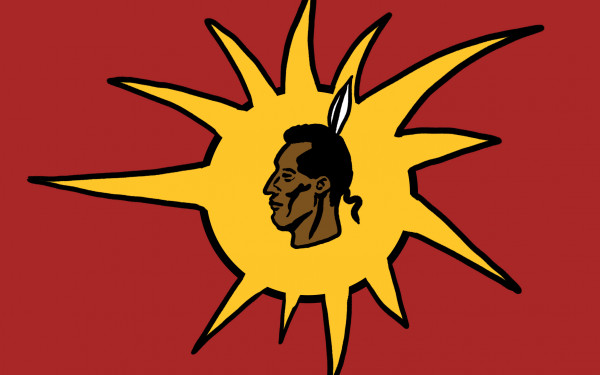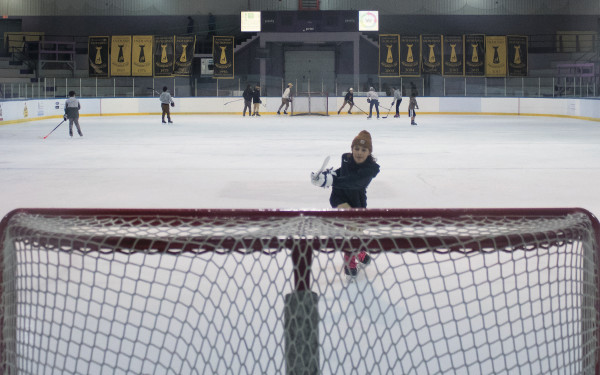“For Five Minutes They Get to Be the Superhero”
The Ongoing Legacy of the Kahnawake Survival School Wrestling Team
If you were to ask Peter Montour to pick his proudest moment as part of the Kahnawake Survival School wrestling team, he would have trouble choosing just one.
Montour has been with the team for 28 years, first as a wrestler and now, since 2006, as its head coach. For two decades, the KSS wrestling team has been uniquely successful. A long list of KSS’s title-winning years decorates the back of the team’s uniform: 1990, ’91, ’92…
For 17 years straight, KSS won the Greater Montreal Athletic Association wrestling championship. After their second-place finish in 2006-07, KSS won the title back the next season—and kept it for the following three years. This year marks the KSS wrestling program’s 30th anniversary.
Trophies aren’t usually what Montour has in mind when you ask him about his happiest moment with the KSS wrestling team, however. Instead, he probably would tell you that he felt proudest when seeing disadvantaged kids enjoy a few minutes of success on the wrestling mat.
Over the years, many of the boys and girls on the KSS wrestling team have come from broken homes, lived with foster families or have had to cope with a parent struggling with drug or alcohol addiction.
“These kids don’t just go home to homework. They have other problems they have to deal with,” Montour said. “When they go out there to wrestle,” he continued, “you know, for five minutes they get to be the superhero. Nothing else can take that away from them. They get to be under the spotlight. That’s their five minutes to shine—and the whole town is there to support them.”
Montour recalled watching his cousin, Ikey Beauvais, win a gold medal at the GMAA finals in 2011. Beauvais’ mother was ill at the time, deemed incapable of taking care of him.
“I almost started crying. For five minutes, the world was around him. He was like, ‘Yeah!’ like this,” Montour said, raising his arms.
“It was almost like in the movie Vision Quest when he wins the fight at the end. You could almost see the confetti falling around him. For those minutes, he was a superstar.
“Next year, he was out of school. He was in Grade 10. He didn’t make Grade 11. For the rest of his life, that’s going to be his moment, because he had nothing else.”
The Middleweight
Josh Johnson is one of the kids currently on the KSS wrestling team who has had it rough.
Johnson, a lanky 15-year-old with short, dark brown hair, weighs in at 145 lbs., making him a middleweight. In his last match this season, something unusual happened.
It was KSS’s last wrestling meet, against the team leading the standings this season, Selwyn House School, an exclusive private school located in Westmount. After falling behind, the KSS Akweks—or “Eagles” in Mohawk—were making a comeback just as Johnson’s turn came to wrestle.
He stepped onto the mat and took his place at the centre circle facing his shorter but stockier opponent from Selwyn.
As soon as the referee had blown his whistle, Johnson got the better of the other boy. Hooking his arm around his opponent’s head, Johnson sunk his hips and used his weight to bring the boy down before holding him on the floor in a headlock.
Cries of “Stick him! Stick him!” could be heard coming from the small crowd of fans assembled in the KSS gym.
Then, just as he was about to pin his opponent, Johnson let go.
“I have a lot of kids who are in foster care or who come from split families. What we tell them is: ‘When you come to wrestling practice, the one thing we guarantee is that it’ll always be safe for you. We’ll always be here to understand you. When you come here, I’m your mother, I’m your father; I’m always here to listen to you.’”
–Peter Montour, coach of the KSS Akweks
“What are you doing!?” shouted Montour, clearly confused. The Selwyn middleweight rose from the mat and ran quickly to the locker room, clutching his nose. He had a nosebleed. Johnson had let the boy go so that he could clean himself up.
Montour seemed a little annoyed with Johnson for letting his opponent off the hook so easily. He told Johnson that he should have waited until the referee stopped the match—to always play to the sound of the referee’s whistle.
When the Selwyn wrestler returned and the match resumed, Johnson got the win that he deserved, act of mercy notwithstanding.
That victory meant he had won just over half his matches this year—a decent record, but probably not good enough for him to wrestle in the all-star meet Feb. 5 at Selwyn House.
Speaking after the match, Johnson said he was always confident that he would win.
“I’m tough,” he said. “Since I started the team, I got tougher. Before, I wasn’t really a fighter—even today, I don’t fight unless I really have to.”
He says he has only ever been in one fistfight—after another kid at school insulted his girlfriend. Since then, he hasn’t fought again.
Johnson said he likes to wrestle because it gives him a way of dealing with his anger.
“It keeps you out of trouble, because when you fight, you sort of get in trouble,” he said. “You can take your anger out doing your moves and your routine.”
Asked what he feels angry about, Johnson said haltingly, “My mom passing away, last February, on the third, in a house fire.”
At a dual meet last year, Johnson broke his right hand and had to be brought to the hospital for treatment. He had lost his match and slammed the padded mat in frustration. In a team photograph on the 2011 KSS annual wrestling poster, Johnson can be seen in the middle of the pack, smiling and making a V sign with his bandaged hand.
Hard Work, Family and Tradition
In the first few weeks of the wrestling season, Montour says he assumes the role of a drill sergeant. In the very first practice, he lays down the rules.
“I’m pretty rough with them,” he said. “I tell them, ‘This is like the army. The only time you’re going to be in better shape is if you join the army. We expect you to be here every day, to follow the rules—and the number one rule is: whatever I say goes.’”
In a typical training session, Montour will stand on the edge of the wrestling mat, booming orders at the wrestlers and watching each one closely as they perform their moves. Most sessions begin with an hour-long warm-up, followed by situation wrestling, freestyle wrestling and games.
Montour says he works his wrestlers especially hard at the beginning of the season to toughen them up. Early on, he usually gives the new recruits a warning: “We’re going to yell at you, but we’re doing it to improve you. The only time you have to worry is when I stop yelling at you, because if I stop it’s because I don’t give a shit about you anymore.”
As the season progresses, however, Montour goes a little easier on his team.
“I become their buddy,” he said.
Montour explained that one of the most important aspects of coaching is to create an environment for his wrestlers where they always feel welcome.
“We suffer the same social ills as other communities do,” he said. “I have a lot of kids who are in foster care or who come from split families. What we tell them is: ‘When you come to wrestling practice, the one thing we guarantee is that it’ll always be safe for you. We’ll always be here to understand you. When you come here, I’m your mother, I’m your father; I’m always here to listen to you.’”
According to Montour, the three pillars of the KSS wrestling team’s success are “hard work, family and tradition.”
When Montour says the wrestling team is a “family,” he doesn’t just mean it figuratively. By his reckoning, more than half of the kids on this year’s roster are directly related to former wrestlers.
One of Montour’s daughters, Kawennanó:ron, has been on the team for four years, but has been wrestling at home for as long as she can remember. In a qualifying tournament last year, she finished one round short of a national ranking. Although Olympic wrestling is a one-person sport, Kawennanó:ron says she always feels part of a team.
“Even though you’re the only one on the mat, you have the whole team to support you,” she said.
Wrestling also teaches responsibility, she added.
“It teaches you that in a time of a lot of troubles, you’re the one who has to fix things.”
If there’s any word that the coaching staff at KSS says as often as family, it’s tradition.
Wrestling is not a traditional sport quite in the same vein as lacrosse, but Montour said that his wrestlers do draw on Mohawk traditions. Historically, the Mohawk nation was known as the “eastern door” of the Iroquois Confederacy, a bulwark against invaders from the east, Montour explained.
“In Mohawk culture, [the men] were sportsmen, we were warriors, we were hunters—and we learned combat training,” he said. “The guys use that warrior pride when they go in there to fight.”
Whenever the team bus crosses the Honoré-Mercier Bridge on the way to a wrestling meet in Montreal, Montour said he tells his wrestlers “they are going to war.” He asks them to stay completely silent until they reach the school and not to speak to their opponents until after the meet is over.
Montour says the other teams get intimidated seeing the silent KSS wrestlers file into a locker room. He recalled leading the team quietly through a high school in Lasalle when a young boy from the school brushed past them and said, anxiously, “They’re here to kill us!”
3_700_467_90.jpg)
“The Working Man’s Wrestling Club”
While still a serious contender in the finals this year, the Kahnawake Survival School wrestling team is no longer as fearsome as they once were.
In the last few years, KSS has faced much stiffer competition from the private schools—Selwyn House and Loyola High School, in Notre-Dame-de-Grâce. This season, KSS tied Loyola for second place, finishing behind Selwyn, which won the GMAA tournament last year.
“There’s more parity in the league now, which is good for the sport,” said Rob Moore, coach of the Selwyn wrestling team. “I like Pete [Montour] and all, but I don’t want him to win every year,” he added wryly.
Montour says he has always enjoyed the challenge of competing against schools like Selwyn, which can afford to hire star coaches.
Moore is a highly accomplished wrestler; in addition to coaching the Selwyn House Gryphons for the past two decades, he recently was one of the coaches for Canada’s wrestling team at the 2012 London Olympics.
In the past, Moore has hired Martine Dugrenier, an Olympian and world champion wrestler, as an assistant coach. Now, Moore is coaching with the help of another Olympic wrestler, Cleopas Ncube.
In addition to the Selwyn team, both Moore and Ncube also coach professional wrestlers and fighters, including current Ultimate Fighting Championship welterweight champion Georges St. Pierre.
In contrast, Montour said the coaches at KSS are all “the working type.” Montour works at social services managing community programs for disabled people. His assistant coach, Karla McGregor, is a former GMAA gold medalist, a substitute teacher at the school and a bartender at a local nightclub.
McGregor said she more often wrestles with the girls on the team because the boys are too shy to get in the ring with her. Montour’s son, Otiohkwano:ron, is a junior assistant coach and an attendant at the Big Bear Trading Post gas station in Kahnawake.
“We’re the working man’s wrestling club,” Montour said, “and there was a time when we beat Selwyn every year.”
Whenever an old KSS wrestler reminisces aloud about the team’s glory years, the name of former wrestling coach Dave Canadian always comes up.
“The experience that Dave brought to the table was so painful—because he didn’t hold back when he showed us the moves. He showed us how to hit them, and how to hit them hard,” said Wayne Delormier, a three-time GMAA champion with KSS in the 1980s.
In 1983, when the KSS wrestling program was in its inaugural year, Delormier and the rest of the team drove to Detroit to attend one of Canadian’s wrestling practice sessions.
At the time, Canadian—whose family hails from Kahnawake—was coaching a state championship team at a local high school.
“The whole goal was to go there and bring Dave Canadian home,” Delormier said. Finally, in 1984, Canadian’s friends in Kahnawake were able to persuade him to return there to coach.
In his first year at KSS, the team had a rocky start.
“After my first six matches here, I remember sitting in the back of my auntie’s station wagon and thinking, ‘Did I make a mistake?’ Then I said, ‘No, I’m here. Fuck it. I’m going to make a difference,’” said Canadian.
In 1990, the KSS wrestling team won its first GMAA championship—the first of 17 titles under Canadian’s reign.
Looking Ahead
When Peter Montour took over for Canadian as head coach in 2006, he retained many of his predecessor’s tried-and-tested coaching methods.
These days, the team is in a relative slump, having finished in third place last year. After nearly two decades of dominance, Montour says there is a lot of pressure from the local community to succeed. Yet he’s confident that the team will soon get back to its winning ways.
Many of the wrestlers on the team are still young and have yet to reach their peak, he explained. He pointed to Landon Glasgow, a hefty, baby-faced 14-year-old.
“He’s a tough puppy,” Montour said, “He’s a pit bull, but he’s still a puppy.
“I’m expecting a lot from my smaller guys, too,” Montour continued, singling out Rorontakente Delormier, the son of GMAA gold medal-winner Wayne Delormier and the brother of Katsenhiio Delormier, a five-time champion.
“He has a lot of pressure on him at home but he also has a lot of support,” said Montour. “Give it two, three years and these guys are going be monsters.
“You know, we all have our problems,” he added, “but this is the place where these kids get a chance to shine.”

2_900_600_90.jpg)
4_900_600_90.jpg)

_600_375_90_s_c1.jpg)


